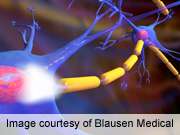There is a significant difference in the brain's response to stress among patients with epilepsy who believe stress is an important factor in seizure control compared to those who do not, according to a study presented at the annual meeting of the American Epilepsy Society, held from Nov. 30 to Dec. 4 in San Diego.
(HealthDay)—There is a significant difference in the brain's response to stress among patients with epilepsy who believe stress is an important factor in seizure control compared to those who do not, according to a study presented at the annual meeting of the American Epilepsy Society, held from Nov. 30 to Dec. 4 in San Diego.
Using functional magnetic resonance imaging, Jane B. Allendorfer, Ph.D., from the University of Alabama at Birmingham, and colleagues assessed the neural response to psychosocial stress in 23 patients with left temporal lobe epilepsy. Participants included 16 patients who believed that stress impacts their seizure control (+S) and seven who did not (−S). The Montreal Imaging Stress Task was used as the stress paradigm, whereby participants performed a simple (control) and difficult (stress) task, with positive and negative feedback provided in the simple and difficult tasks, respectively.
The researchers found that, in the +S group, there was increased activation bilaterally in the superior temporal gyrus (STG) in response to the difficult versus simple math problems. In response to negative versus positive feedback, in the +S group, there was increased activation in the left insula and bilaterally in the STG, Brodmann area 39, and posterior cingulate. Increased activation was not seen in stressful conditions in the −S group.
"We also hypothesize that the difference in brain activation patterns may be related to why some epilepsy patients have seizures more frequently than do other patients," Allendorfer said in a statement.
More information:
Abstract
More Information
Copyright © 2012 HealthDay. All rights reserved.




















